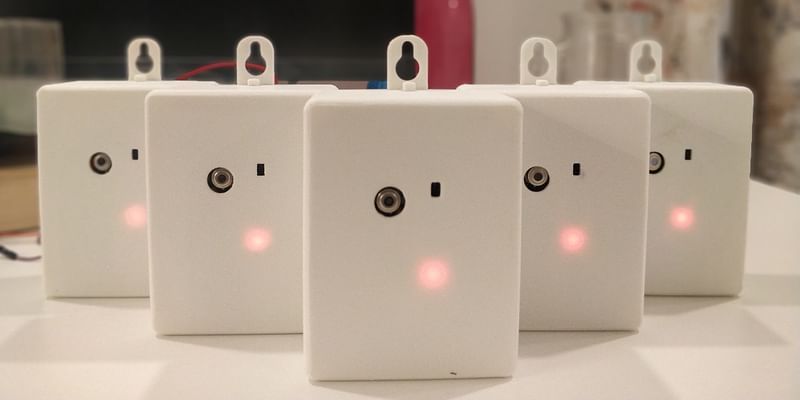As India begins to resume all economic activity following the end of the COVID-19-induced lockdown, businesses are employing a host of measures to ensure the safety of their employees and partners. From handheld thermal scanners to necessitating the use of masks and sanitisers, organisations everywhere are adopting a host of preventive measures to reduce the risk of a coronavirus infection.
To be sure, the use of a handheld thermal scanning device at the entry points of offices, restaurants, hospitals, or, for that matter, any public place has now become commonplace. However, unbeknownst to many, these thermal scanners – which were originally designed for industrial use to test the temperature of large machines – cannot precisely detect the temperature of individuals, unless they’re recalibrated for medical use.

Startup BlueSemi has developed a first-of-its-kind contactless, wireless IoT-based thermal scanner called Neem
To address this need, Hyderabad-based deep-tech startup BlueSemi R&D Pvt. Ltd. has developed the world’s first contactless, wireless thermal scanning device that accurately measures the exact temperature of individuals and records that data without any manual intervention.
Designed for medical use, BlueSemi’s thermal sensor and imager – called Neem – is the first of its kind in the world, given its ability to speedily detect, record, and transmit an individual’s precise temperature data, without requiring any physical contact.
Founded by Sunil Kumar Maddikatla in 2017, BlueSemi is a specialist in zero power to ultra-low power devices using Internet of Things (IoT) technology. The T-Hub-incubated startup’s flagship product, called Eon, runs on zero power, drawing energy from ambient sources in the environment to power smart homes and devices like wearables.
“We've been working on sensors and wireless communication for the past three years. When we saw the COVID-19 pandemic unfolding, we felt that we should contribute, but that we should do so in a smart way,” says Sunil.
Sunil was determined to leverage his nine-member team’s tech know-how to provide a high-quality Make in India product that is unique in its offering and employed automation for good.
Enter Neem – an indigenous smart thermal scanning device, conceptualised and designed by Sunil and his team in less than two months, and requiring no human interaction at the product, scanning, or monitoring level.
“Neem is BlueSemi’s solution to handling a healthcare situation, such as the coronavirus pandemic, as efficiently as possible,” Sunil says.
The Make in India product Neem, which is manufactured in Hyderabad, is scheduled for mass shipping this month, having completed various testing rounds in public places such as railway stations and hospitals.
Neem vs regular thermal gun
Unlike a temperature gun, which necessitates the physical presence of a security guard or a healthcare professional to record people’s temperature, the artificial intelligence (AI)-enabled Neem does that job on its own.
For example, hospitals and corporate offices can install Neem at their entry points and the sensor immediately detects the body temperature of a person who is within a distance of 15 cm from it.
This way, hospitals can protect their healthcare workers from being infected, while corporates can eliminate the risk of their employees or their security personnel contracting the virus.
More importantly, as thermal guns were originally designed for industrial use, they typically throw up a difference of three to five degrees centigrade difference from the actual temperature.
While this discrepancy is no cause for concern when monitoring the temperature of machines, where a reading of 1,200 degree centigrade or 1,205 degree centigrade is not considered a major difference, the same is not the case when measuring a person’s body temperature.
That’s where Neem comes in.
Given that the sensor is designed for medical use, it accurately measures an individual’s body temperature and records the information in a specialised digital app that can be downloaded on your mobile phone or integrated into the company’s security or healthcare systems.
Through the mobile app, the device can be remotely operated. This means, a security personnel mandated with checking the body temperature of employees can – while sitting remotely – switch on and off the Neem device and be alerted by the device if the person is standing outside the monitoring range.
“Our app actually uses three parameters. One, the body temperature. Two, the ambient temperature. And three, the distance that the person is from the device. That way, you will not need a person to keep monitoring. The app monitors this on its own,” Sunil explains.
Customers and use case
Neem has two versions – the first, for individuals, and the second, for corporates. The latter – called SenS –enables Neem software to be integrated with corporates’ central security systems.
When used in a corporate setting, employees will first have to scan their RFID, or unique identity tag. On doing so, the device identifies whether the employee exists in the database, following which it releases the temperature scan.
“When the RFID is scanned and the body temperature is cleared, only then the company door opens. Else, it won't,” Sunil says.
The individual thermal scanner devices are priced at Rs 7,500 per sensor, while the corporate versions follow a cloud subscripton-based pricing model with six month or annual packages to start with and monthly, thereafter.
The beauty of the product is that both Neem and Eon can be integrated together, where Neem can run perpetually by harvesting ambient energy, reveals Sunil.
“If someone wants a professional battery life for the device, then we are offering Neem and Eon together. But if someone is okay with just two months, then we are not offering this integrated option. We give them the option to choose,” Sunil says.

BlueSemi Founder & CEO Sunil Kumar Maddikatla
Bigger use case
Apart from allowing companies and hospitals to monitor an individual’s body temperature, the Neem mobile app also enables them to record and access historical data.
“There's a more bigger use case than just for individuals and corporates. Using data, you will know the red zones within corporates. Based on the data, you can do a lot of analysis and can take preventive measures,” he avers.
This data, in turn, will make it possible to track a person’s health condition over time, and analyse the general health of the individuals as well as identify those areas or communities most at risk, Sunil says.
“Neem can also help the government monitor the state of health of the people, particularly of those who are likely to spread the virus or be affected most by it,” he adds.
Already, BlueSemi has received interest from many corporates, distributors, and state governments. Neem, which is already installed in offices in Hyderabad, has seen demand come in from other states like Maharashtra, Goa, Chandigarh, Gujarat, Delhi, Punjab, and Karnataka.
BlueSemi boasts of advisors from UC Berkeley and Cornell University, and is seed funded by top executives from major industry leaders such as Google, KLA Tencor, among others.
The startup is now looking to raise a bridge to Series A round as it looks to mass produce 20,000 Neem products monthly and establish both Neem and Eon as market pioneering technology.
“We have financing needs for both Eon and Neem. We want to provide a quality product - that is our number one priority. Number two is to have a strong market where we can be established as a brand for advanced deep tech Electronics,” Sunil says
(Edited by Megha Reddy)
Want to make your startup journey smooth? YS Education brings a comprehensive Funding and Startup Course. Learn from India's top investors and entrepreneurs. Click here to know more.
Link : https://yourstory.com/2020/06/startup-bluesemi-contactless-wireless-thermal-scanner-coronavirus
Author :- Tenzin Pema ( )
June 03, 2020 at 05:40AM
YourStory


